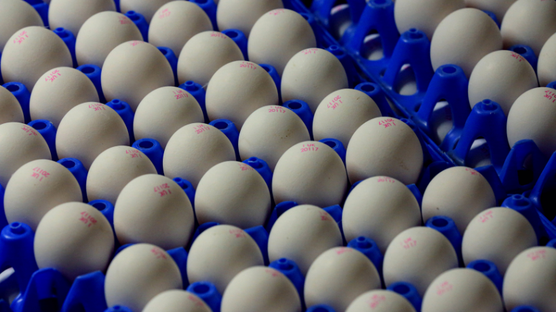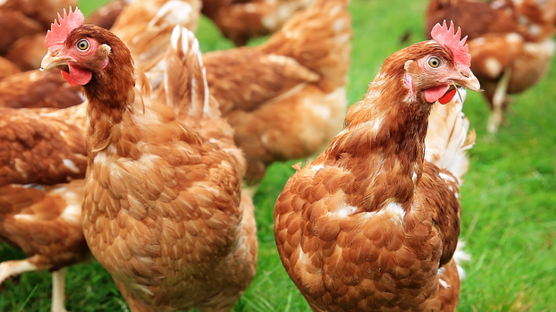
Published on May 28, 2025
L J Fairburn & Son Limited Welcome New Rearing Manager and Excellent Pullet Quality Puts Hill Top Hens Ltd On The Front Foot
L J Fairburn and Son Rearing Farms Manager Liam Orchard has been in his new role for just over a year, overseeing all eight of their rearing farms which rear over 1.7 million pullets annually.
His role involves all aspects of pullet rearing, from nurturing the day-old chicks through to the transfer at 16 weeks.
“I started out rearing turkeys before moving to broilers,” says Liam. “The move to layers was a new challenge and I like the fact that egg layers have a more natural growth cycle and feed regime, which allows them to develop naturally, in readiness for laying. The family business ethos of Fairburns is important to me, and I have been fortunate to learn from two of Fairburns' veterans. George Jacklin, the farm manager of Belchford, who is a fantastic stockman, and Keith Parish who has been with Fairburns for over 40 years and has generously passed on a lifetimes experience.
“We are dedicated to the highest levels of biosecurity, we take great care with ventilation and to help the birds digest food and maintain gut health by providing them with any additives/vitamins they may require. Our mission is to ensure that when the pullets leave us, at 16 weeks old, they are in great shape for the laying stage of their lifecycle.”
This teamwork has shown some incredible results, “A recent flock of 6,000-day old Shaver chicks, hatched by Joice and Hill, recorded the lowest mortality I have ever seen. The chick quality was exceptional, and we only lost 12 birds over the 16-week rearing period.” Liam says.
Excellent pullet quality puts Hill Top Hens on the front foot
Located on the southern edge of the Lincolnshire Wolds, near Horncastle, Hill Top Hens Ltd is a family-run business, managed by Stuart Russell and his father, John. A feed, pullet and packing contract with L J Fairburn and Son fits their overall business model, with the excellent pullet quality from the Fairburns team making a crucial contribution to the overall performance.
“The pullet quality is excellent. Birds coming in above target weight means we are on the front foot from the start. We normally bring the birds into lay at 21 weeks, but the bird weight is so good we could have started the last flock a week early, and because the bird weight is good, egg weight comes up quickly too.”
A fourth generation
Hill Top Hens Ltd is part of a farming tradition that spans four generations. The Russell family’s farming roots go back to 1952 when Stuart’s grandfather, Walter, founded W. Russell and Son. The family has since grown the farm to encompass 1,150 acres of arable and pastureland. Stuart, who gained a National Diploma in Agriculture from Shuttleworth Agricultural College near Bedford, travelled in Australia, including working on a wheat harvest, before returning home to the farm in May 97. Tom Russell, who recently completed a BSc in Agriculture with Farm Business Management, is expected to become the fourth generation to join the business soon, after returning from working a harvest in the USA.
Diversifying into egg production
A combination of factors led to the decision to diversify into egg production in 2017, as Stuart explains. “In 2016, we were importing poultry litter for use on the arable farm, the benefits were clear to see in the crop yields, but returns from the arable activities were marginal, and at the same time, we were hearing good things about the egg sector. So, in 2017 we put in a planning application for a new 32,000 unit, which was granted after a committee decision.
"We opted for the Big Dutchman Natura Step Multi-Tier Free Range House, which sits in 40 acres of grassland and trees, providing ideal ranging conditions for the hens.
“Before choosing the system we looked at other local laying farms and chose Big Dutchman because we wanted something straightforward that fitted with our existing management practices. The system is focused on the welfare of the birds, without disregarding functionality and efficiency, which is important to us as egg producers. It is easy to understand for the layers, and they can exhibit their natural behaviours, stay healthy and lay their eggs under hygienic conditions.”

A focus on detail and data
Currently on their fifth consecutive 32,000 bird flock of Bovans Brown hens, Hill Top Hens Ltd have developed a management approach that combines data-driven insights with meticulous care, to get the best from the birds. Their success is attributed to maintaining a strict routine, carefully monitoring their flock, and leveraging technology to enhance efficiency.
Running a successful poultry unit requires attention to detail, and Stuart and his team—particularly long-time farm worker Mike Hewson—are committed to optimising every aspect of the operation. "We keep a detailed flock calendar and learn from every cycle," Stuart says. "We’re always looking for ways to make small improvements, whether it's adjusting water systems or enhancing our feed management. For example, we now use a daily low-dose aqua clean system to ensure our water lines remain clean, which helps maintain bird health.
"The farm has also found that small adjustments, like worming every six weeks instead of seven, add up to improvements in bird health and productivity." Stuart adds. “In a similar vein we fitted automatic flushing on water lines in 2023. We run it once a week for added hygiene, but the system is fully automated so we can choose any frequency.”
“Nothing beats being in the house, but the new technology allows us to keep an eye on the house, and security, even when we can’t be there. We use Big Farm Network with sensors that give constant feedback, information and data from sensors and cameras, accessed by phone through the Viper Touch control system. It monitors animal weights, daily weight gains, feed conversion and formulas, feed and water consumption, losses, climate data, luminous intensity, and power consumption.
“It is an extra cost, but the technology is invaluable and helps monitor a big investment – after all, it’s a remote site, and this gives us eyes and ears on the site when we can’t be here” Stuart explains.
Dividends at the end of the cycle
The result of a balanced breeding programme by Hendrix Genetics, the Bovans Brown is a highly versatile and robust egg layer. A combination of high peak production, great laying persistency, and a flat egg weight curve ensures that the robust, adaptable, and easy to manage birds produce high numbers of first quality dark brown eggs.
“The Bovans Brown suits our management style,” Stuart reports ”We stick carefully to the routine established in the four weeks before they start laying. The results speak for themselves, and we took the last flock to 84 weeks to fit around our other commitments and they did well, with shell quality and seconds more than acceptable.”
Embracing renewables
To address rising energy costs, Solar panels were added after the first flock, when even back in 2017, electricity costs turned out to be higher than budgeted. “Now that energy prices have escalated, installing the 100 Kw solar system has turned out to be the best thing we ever did.” Stuart says “We don’t have battery storage now, but on sunny days all our needs are covered by solar power, at night we rely on the grid. Nevertheless, our bills have halved, and we may well explore battery storage after our current contract runs out. We have a neighbour who is completely off grid with generator back up and that may be the way forward. The solar power system helps reduce reliance on the grid, providing a more stable and sustainable energy solution for the farm, especially as energy prices continue to fluctuate. The egg business is challenging enough without energy price uncertainty.”
Looking to the future
Hill Top Hens Ltd value their relationships with key partners, including packers, feed and pullet suppliers LJ Fairburn, Crowshall Vets, equipment provider Big Dutchman and chick hatchery, Joice and Hill.
"Loyalty is important to us in business," says Stuart. "We value our relationships with Fairburns, who have been an integral part of our success. Communication is good, we know they are always willing to help, and buying the full package from them suits our wider commitments. We enjoy working with them, and if we expand, we will stick with them and the Bovans Browns!”
Pictured: Keith Parish (Left), Liam Orchard (Right)



